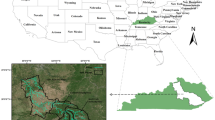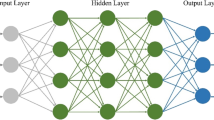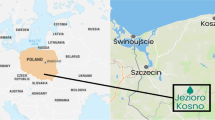Abstract
Forecasting river streamflow is crucial for hydrological science and optimal water resources management. In this study, six predictive methods were developed, including three machine learning models—random forest (RF), decision tree (DT), and K-nearest neighbors (KNN)—and three deep learning frameworks comprising convolutional neural networks (CNN), long short-term memory (LSTM), and a hybrid CNN-LSTM model. Two gauging stations on the McKenzie River in the United States (USGS 14162500 and USGS 14163900) were selected as case studies for model performance evaluation. Error metrics including root mean square error (RMSE), mean absolute error (MAE), determination coefficient (R²), and Kling-Gupta efficiency (KGE) were applied. Results demonstrated that the deep learning models consistently outperformed the machine learning methods for river streamflow forecasting at both sites. The hybrid CNN-LSTM model yielded the most accurate predictions. Specifically, the error metrics for the superior CNN-LSTM model during testing stage were as follows: at USGS 14162500, RMSE = 14.68 m³/s, MAE = 6.29 m³/s, R² = 0.930, and KGE = 0.960; at USGS 14163900, RMSE = 22.54 m³/s, MAE = 8.48 m³/s, R² = 0.882, and KGE = 0.935.






Similar content being viewed by others
Explore related subjects
Discover the latest articles, news and stories from top researchers in related subjects.Data Availability
Data for this research is available upon request from the corresponding author.
References
Akiner ME, Kartal V, Guzeler AC, Karakoyun E (2024) Exploring the applicability of the experiment-based ANN and LSTM models for streamflow estimation. Earth Sci Inform 17:3111–3135
Ayana Ö, Kanbak DF, Kaya Keleş M, Turhan E (2023) Monthly streamflow prediction and performance comparison of machine learning and deep learning methods. Acta Geophys 71(6):2905–2922
Belmahdi B, Bouardi AE (2024) Short-term solar radiation forecasting using machine learning models under different sky conditions: evaluations and comparisons. Environ Sci Pollut Res 31(1):966–981
Bhardwaj SS, Jha MK, Uniyal B (2024) Assessing efficacy of baseflow separation techniques in a Himalayan River Basin. Northern India. Environ Process 11(1):4
Cheng M, Fang F, Kinouchi T, Navon I, Pain C (2020) Long lead-time daily and monthly streamflow forecasting using machine learning methods. J Hydrol 590
Dahmani S, Latif SD (2024) Streamflow data infilling using machine learning techniques with Gamma test. Water Resour Manag 38(2):701–716
Dalkilic HY, Kumar D, Samui P, Dixon B, Yesilyurt SN, Katipoğlu OM (2023) Application of deep learning approaches to predict monthly stream flows. Environ Monit Assess 195(6):705
Deepa SN, Natarajan N, Berlin M (2023) Enhanced variational mode decomposition with deep learning SVM kernels for river streamflow forecasting. Environ Earth Sci 82(22):544
Dehghani A, Moazam HMZH, Mortazavizadeh F, Ranjbar V, Mirzaei M, Mortezavi S, Ng JL, Dehghani A (2023) Comparative evaluation of LSTM, CNN, and ConvLSTM for hourly short-term streamflow forecasting using deep learning approaches. Ecol Inform 75:102119
Dong J, Xing L, Cui N, Zhao L, Guo L, Gong D (2023) Standardized precipitation evapotranspiration index (SPEI) estimated using variant long short-term memory network at four climatic zones of China. Comput Electron Agric 213:108253
Elbeltagi A, Pande CB, Kumar M, Tolche AD, Singh SK, Kumar A, Vishwakarma DK (2023) Prediction of meteorological drought and standardized precipitation index based on the random forest (RF), random tree (RT), and Gaussian process regression (GPR) models. Environ Sci Pollut Res 30(15):43183–43202
Fang J, Yang L, Wen X, Yu H, Li W, Adamowski JF, Barzegar R (2024) Ensemble learning using multivariate variational mode decomposition based on the Transformer for multi-step-ahead streamflow forecasting. J Hydrol 636:131275
Fratello M, Tagliaferri R (2018) Decision trees and random forests. Encyclopedia of Bioinformatics and Computational Biology. 1:374–383
Gao P, Du W, Lei Q, Li J, Zhang S, Li N (2023) NDVI forecasting model based on the combination of time series decomposition and CNN–LSTM. Water Resour Manag 37(4):1481–1497
Granata F, Di Nunno F, de Marinis G (2022) Stacked machine learning algorithms and bidirectional long short-term memory networks for multi-step ahead streamflow forecasting: A comparative study. J Hydrol 613:128431
Hapuarachchi HAP, Bari MA, Kabir A, Hasan MM, Woldemeskel FM, Gamage N, Sunter PD, Zhang XS, Robertson DE, Bennett JC (2022) Development of a national 7-day ensemble streamflow forecasting service for Australia. Hydrol Earth Syst Sci 26(18):4801–4821
He M, Jiang S, Ren L, Cui H, Qin T, Du S, Zhu Y, Fang X, Xu C-Y (2024) Streamflow prediction in ungauged catchments through use of catchment classification and deep learning. J Hydrol 639:131638
Ho C-H, Park I, Kim J, Lee J-B (2023) PM2. 5 forecast in korea using the long short-term memory (LSTM) model. Asia-Pacific J Atmos Sci 59(5):563–576
Hu M, Tsang EC, Guo Y, Chen D, Xu W (2022) Attribute reduction based on overlap degree and k-nearest- neighbor rough sets in decision information systems. Inform Sci 584:301–324
Ikram RMA, Mostafa RR, Chen Z, Parmar KS, Kisi O, Zounemat-Kermani M (2023) Water temperature prediction using improved deep learning methods through reptile search algorithm and weighted mean of vectors optimizer. J Marine Sci Eng 11(2):259
Izadi A, Zarei N, Nikoo MR, Al-Wardy M, Yazdandoost F (2024) Exploring the potential of deep learning for streamflow forecasting: A comparative study with hydrological models for seasonal and perennial rivers. Expert Syst Appl 252:124139
Kedam N, Tiwari DK, Kumar V, Khedher KM, Salem MA (2024) River stream flow prediction through advanced machine learning models for enhanced accuracy. Results Eng 22:102215
Kheimi M, Almadani M, Zounemat-Kermani M (2024) Stochastic (S [ARIMA]), shallow (NARnet, NAR- GMDH, OS-ELM), and deep learning (LSTM, Stacked-LSTM, CNN-GRU) models, application to river flow forecasting. Acta Geophys 72(4):2679–2693
Khoshkalam Y, Rousseau AN, Rahmani F, Shen C, Abbasnezhadi K (2023) Applying transfer learning techniques to enhance the accuracy of streamflow prediction produced by long Short-term memory networks with data integration. J Hydrol 622:129682
Kilinc HC, Haznedar B, Katipoğlu OM, Ozkan F (2024) A comparative study of daily streamflow forecasting using firefly, artificial bee colony, and genetic algorithm-based artificial neural network. Acta Geophys 72:4575–4595
Kilinc HC, Yurtsever A (2022) Short-term streamflow forecasting using hybrid deep learning model based on grey wolf algorithm for hydrological time series. Sustainability 14(6):3352
Latif SD, Ahmed AN (2023) Streamflow prediction utilizing deep learning and machine learning algorithms for sustainable water supply management. Water Resour Manag 37(8):3227–3241
Le X-H, Nguyen D-H, Jung S, Yeon M, Lee G (2021) Comparison of deep learning techniques for river streamflow forecasting. IEEE Access 9:71805–71820
Liu G, Ouyang S, Qin H, Liu S, Shen Q, Qu Y, Zheng Z, Sun H, Zhou J (2023) Assessing spatial connectivity effects on daily streamflow forecasting using Bayesian-based graph neural network. Sci Total Environ 855:158968
Majeed T, Mir RA, Dar RA, Haq MA, Rasool SN, Assad A (2024) Deep learning-based streamflow prediction for western Himalayan river basins. Int J Syst Assur Eng Manag. https://doi.org/10.1007/s13198-024-02403-x
Mehdizadeh S, Kozekalani Sales A (2018) A comparative study of autoregressive, autoregressive moving average, gene expression programming and Bayesian networks for estimating monthly streamflow. Water Resour Manag 32:3001–3022
Mei Z, Peng T, Chen L, Singh VP, Yi B, Leng Z, Gan X, Xie T (2024) Coupling SWAT and LSTM for improving daily streamflow simulation in a humid and semi-humid river basin. Water Resour Manag. https://doi.org/10.1007/s11269-024-03975-w
Mugume SN, Murungi J, Nyenje PM, Sempewo JI, Okedi J, Sörensen J (2024) Development and application of a hybrid artificial neural network model for simulating future stream flows in catchments with limited in situ observed data. J Hydroinform 26(8):1944–1969
Ng BA (2024) En-RfRsK: An ensemble machine learning technique for prognostication of diabetes mellitus. Egypt Inform J 25:100441
Ng KW, Huang YF, Koo CH, Chong KL, El-Shafie A, Ahmed AN (2023) A review of hybrid deep learning applications for streamflow forecasting. J Hydrol 625(B):130141
Niu W-J, Feng Z-K, Yang W-F, Zhang J (2020) Short-term streamflow time series prediction model by machine learning tool based on data preprocessing technique and swarm intelligence algorithm. Hydrol Sci J 65(15):2590–2603
Patel S (2023) An overview and application of deep convolutional neural networks for medical image segmentation, pp. 722–728, IEEE.
Pham LT, Luo L, Finley A (2021) Evaluation of random forests for short-term daily streamflow forecasting in rainfall-and snowmelt-driven watersheds. Hydrol Earth Syst Sci 25(6):2997–3015
Salman HA, Kalakech A, Steiti A (2024) Random Forest Algorithm Overview. Babylonian J Mach Learn 2024:69–79
Samantaray S, Sahoo A (2024) Prediction of flow discharge in Mahanadi River Basin, India, based on novel hybrid SVM approaches. Environ Develop Sustain 26(7):18699–18723
Sharma RK, Kumar S, Padmalal D, Roy A (2023) Streamflow prediction using machine learning models in selected rivers of Southern India. Int J River Basin Manag 22(4):529–555
Shoorkand HD, Nourelfath M, Hajji A (2024) A hybrid CNN-LSTM model for joint optimization of production and imperfect predictive maintenance planning. Reliab Eng Syst Saf 241:109707
Singh SK, Jha S, Gupta R (2024) Enhancing the accuracy of wind speed estimation model using an efficient hybrid deep learning algorithm. Sustain Energy Tech Assess 61:103603
Suyanto S, Meliana S, Wahyuningrum T, Khomsah S (2022) A new nearest neighbor-based framework for diabetes detection. Expert Syst Appl 199:116857
Takai Eddine Y, Nadir M, Sabah S, Jaafari A (2024) Integrating support vector machines with different ensemble learners for improving streamflow simulation in an ungauged watershed. Water Resour Manag 38(2):553–567
Ullah B, Fawad M, Khan AU, Mohamand SK, Khan M, Iqbal MJ, Khan J (2023) Futuristic streamflow prediction based on CMIP6 scenarios using machine learning models. Water Resour Manag 37(15):6089–6106
Uluocak I, Bilgili M (2024) Daily air temperature forecasting using LSTM-CNN and GRU-CNN models. Acta Geophys 72(3):2107–2126
Vogeti RK, Jauhari R, Mishra BR, Raju KS, Nagesh Kumar D (2024) Deep learning algorithms and their fuzzy extensions for streamflow prediction in climate change framework. J Water Clim Change 15(2):832–848
Vu D-Q, Mai ST, Dang TD (2023) Streamflow prediction in the Mekong River Basin using deep neural networks. IEEE Access.
Wang Y, Pei L, Wang J (2024a) Precipitation prediction in several Chinese regions using machine learning methods. Int J Dyn Control 12(4):1180–1196
Wang Z, Xu N, Bao X, Wu J, Cui X (2024b) Spatio-temporal deep learning model for accurate streamflow prediction with multi-source data fusion. Environ Modell Softw 178:106091
Xu W, Chen J, Zhang XJ (2022) Scale effects of the monthly streamflow prediction using a state-of-the-art deep learning model. Water Resour Manag 36(10):3609–3625
Yalçın S, Eşit M, Çoban Ö (2023) A new deep learning method for meteorological drought estimation based-on standard precipitation evapotranspiration index. Eng Appl Artif Intell 124:106550
Yamashita R, Nishio M, Do RKG, Togashi K (2018) Convolutional neural networks: an overview and application in radiology. Insights Imaging 9:611–629
Yang C, Xu M, Kang S, Fu C, Hu D (2023) Improvement of streamflow simulation by combining physically hydrological model with deep learning methods in data-scarce glacial river basin. J Hydrol 625:129990
Funding
This paper has not received any funding.
Author information
Authors and Affiliations
Contributions
M D: Formal analysis, Investigation, Methodology, Resources, Software, Writing – original draft. A G: Conceptualization, Formal analysis, Investigation, Writing – original draft, Writing – review & editing. S M: Conceptualization, Data curation, Supervision, Investigation, Validation, Writing – original draft, Writing – review & editing. A D: Writing – original draft, Writing – review & editing.
Corresponding author
Ethics declarations
Ethics Approval and Consent to Participate
Not applicable.
Consent for Publication
All authors agree to publish.
Competing Interests
The authors declare that there is no conflict of interests regarding the publication of this paper.
Additional information
Publisher’s Note
Springer Nature remains neutral with regard to jurisdictional claims in published maps and institutional affiliations.
Rights and permissions
Springer Nature or its licensor (e.g. a society or other partner) holds exclusive rights to this article under a publishing agreement with the author(s) or other rightsholder(s); author self-archiving of the accepted manuscript version of this article is solely governed by the terms of such publishing agreement and applicable law.
About this article
Cite this article
Danesh, M., Gharehbaghi, A., Mehdizadeh, S. et al. A Comparative Assessment of Machine Learning and Deep Learning Models for the Daily River Streamflow Forecasting. Water Resour Manage 39, 1911–1930 (2025). https://doi.org/10.1007/s11269-024-04052-y
Received:
Accepted:
Published:
Issue Date:
DOI: https://doi.org/10.1007/s11269-024-04052-y




